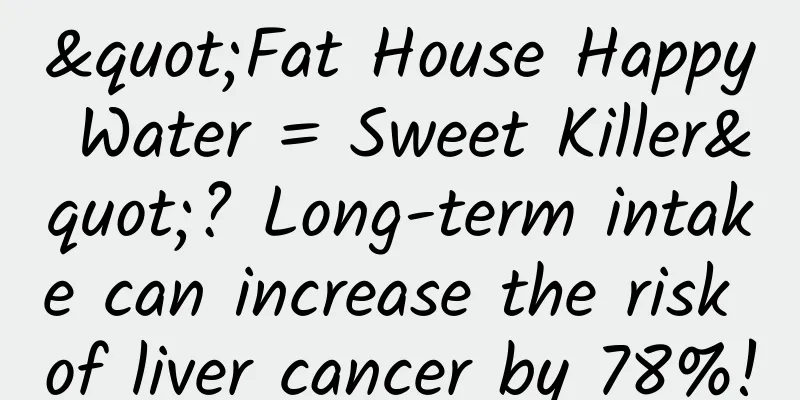"Fat House Happy Water = Sweet Killer"? Long-term intake can increase the risk of liver cancer by 78%!

|
Sugar intake linked to increased liver cancer risk A study in the European Prospective Investigation into Cancer and Nutrition (EPIC) project showed that for every additional 50 grams of sugar consumed per day, the risk of liver cancer increased by 43% (HR=1.43, 95%CI 1.17-1.74). As one of the sources of daily sugar intake, soft drinks contain an average of 55-130 grams of sugar per liter. Will excessive intake of sugary drinks also increase the risk of liver cancer? The answer is here. Recently, scientists from the University of South Carolina, Harvard University and other research institutions shared their latest research results at the 2022 American Nutrition Society Annual Meeting, proving that women who drink more than one can of sugary drinks (355ml, canned cola 330ml) a day have a 78% higher risk of liver cancer than women who drink no more than three cans of sugary drinks a month! It seems that using "sweet burden" to describe sugary drinks is too mild. Drinking beverages not only makes you fat, but also increases the risk of cancer. They should be called "sweet killers." The study was published in Current Developments in Nutrition. The research data comes from the Women's Health Initiative (WHI), one of the largest women's health projects in the history of the United States. It has recruited more than 160,000 women in 40 clinical centers to conduct clinical trials, community prevention studies, and observational studies, and is committed to making scientific contributions to women's health. The subjects were 90,504 women aged 50-79, with an average follow-up period of 18.7 years. A questionnaire survey was conducted to understand their medical history and health habits, including the intake of sugary drinks. Among them, 7.3% of the participants consumed "one serving" of sugary drinks, or more than 355 ml, every day (which can be simply compared to a can of drink). The "sugary drinks" here include soft drinks and fruit drinks. During the follow-up period, a total of 205 women were diagnosed with liver cancer. Compared with women who rarely consumed beverages (<3 servings/month), women who consumed more than one serving of sugary drinks per day had a 78% increased risk of liver cancer (HR=1.78, 95%CI = 1.09-2.95, P=0.007). Sugary drink consumption was still associated with an increased risk of liver cancer even after adjusting for coffee or tea consumption, history of liver disease, or excluding participants who were diagnosed with liver cancer or had diabetes in the first two years of follow-up. As for why sugary drinks increase the risk of liver cancer, one reason may be that excessive intake of sugary drinks can easily cause obesity, type 2 diabetes and non-alcoholic fatty liver disease, which are all risk factors for liver cancer. On the other hand, excessive intake of sugary drinks may cause insulin resistance, accompanied by increased insulin levels in the blood. Insulin has a mitogenic effect, which increases the possibility of cell cancer. Since sugary drinks are not allowed, is it healthy to choose sugar-free drinks with artificial sweeteners? A meta-analysis study published in 2021 showed that excessive consumption of carbonated beverages containing artificial sweeteners was associated with a 28% increased risk of liver cancer. From this point of view, not drinking beverages is the best choice for physical health. (But drinking milk tea is good for mental health!) References: 1. Association Between Sugar-Sweetened Beverage Intake and Liver Cancer Risk in the Women's Health Initiative https://doi.org/10.1093/cdn/nzac052.026 2.Stepien M, Duarte-Salles T, Fedirko V, et al. Consumption of soft drinks and juices and risk of liver and biliary tract cancers in a European cohort. Eur J Nutr. 2016;55(1):7-20. doi:10.1007/s00394-014-0818-5 3.Jatho A, Cambia JM, Myung SK. Consumption of artificially sweetened soft drinks and risk of gastrointestinal cancer: a meta-analysis of observational studies. Public Health Nutr. 2021;24(18):6122-6136. doi:10.1017/S136898002100104X |
<<: Know a little about “Medicine” | Can I apply hormones on my baby’s face to treat eczema?
>>: Why is it said that the blood pressure control target for the elderly is “dynamic”?
Recommend
Which is more serious, breast nodules or breast cysts?
Many women often think of breast cancer when they...
What should a woman eat for the first meal right after giving birth?
What a mother experiences during childbirth is a ...
Why do I feel dizzy and nauseous after exercising?
Jogging is a very healthy sport. There are many p...
What is the cause of a small pimple on a woman's genitals?
It is common for women to have small bumps on the...
Can I massage my vagina while pregnant?
It is generally not allowed to massage the genita...
Why does eating pumpkin increase blood sugar instead of lowering it?
It's pumpkin season again. Pumpkins are soft,...
What is the cause of the leucorrhea smell after sex?
Women are very prone to gynecological diseases, a...
The beginning of spring is here! Remember these 6 tips for keeping fit during the beginning of spring to stay healthy and safe for the whole year!
February 4th marks the beginning of spring, the f...
Is fluff pulp harmful to the body?
When it comes to fluff pulp, you may not know wha...
How long should I wear a belly band after a cesarean section?
After a woman becomes pregnant, her abdomen will ...
Postpartum recovery club
Many women experience significant changes in thei...
What does intramural uterine fibroids mean?
Intramural uterine fibroids are a more common typ...
Is it normal to have breast tenderness before your period?
Mature women have menstruation every month, but b...
Women who love to smile are more sexy
Laughter is a basic way for people to convey frie...
When is the best time for women to lose weight?
Losing weight is an issue that girls are very con...









![[Popular Science Lecture] Exploring Neonatal Hyperbilirubinemia: Causes, Symptoms and Treatments](/upload/images/67f195ce55a13.webp)